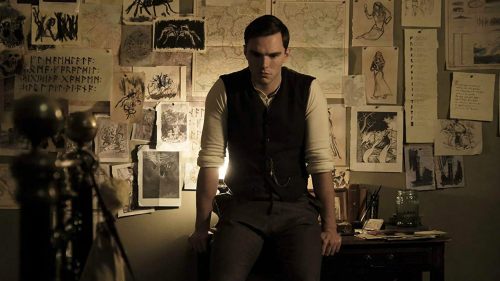REBEL IN THE RYE Review: Searching For Holden Caulfield
The Tortured Genius Biopic™ is a tried and true cinematic formula that usually results in nothing more than boring claptrap. Unfortunately, Rebel in the Rye – Danny Strong’s admittedly polished feature directorial debut – squanders Kenneth Slawenski’s critical biography of J.D. Salinger by having its central literary prodigy (portrayed by Fury Road War Boy, Nicholas Hoult) get his own brilliance spelled out to him by everyone else in the movie. For years, Hollywood’s attempted to adapt Salinger’s unfilmable classic, Catcher in the Rye, so instead of bringing that piece of assigned high school reading to the screen, Strong endeavors to fictionalize its conception. He fails, in spectacular fashion.
It’s certainly not for lack of trying, as Strong adapts Slawenski’s text (J.D. Salinger: A Life) by employing every narrative trick and trope we’ve ever witnessed in so-called prestige motion pictures. There’s a framing device, where Salinger’s already been committed to a veteran’s hospital, letting us know the gruesome end of his anguished combat path. Then we flash back six years – New York City, ’39 – where we find the disapproving parents of “Jerry” (Hope Davis and Victor Garber) telling him there’s no money in writing, and to instead embark upon a “bacon business” career with a Salinger Family friend. A college mentor, Whit Burnett (Kevin Spacey), schools him in the art of accepting rejection, only to finally fit one of his earliest works (“The Young Folks”) into the magazine he edits. There’s even an account of Salinger’s post-WWII PTSD, in perhaps the movie’s most hackneyed decision. You could sub any invented avatar for the young, brilliant star in for Jerome David Salinger, and the movie would remain the same: trite, uninspired, and undefined.
“My dad doesn’t love me, either,” Salinger says to young flame, Oona O’Neil (Zoey Deutch), and it comes off as the sort of bullshit armchair psychoanalysis we’d expect from a freshman term paper. Jerome resists “dumbing down” his writing, like his agent (Sarah Paulson) suggests. All the while, you wish Strong would’ve taken his own movie’s advice and lightened (or loosened) up a little, both in tone and formal execution. Though Kramer Morgenthau’s cinematography is rich in oak browns and pearl whites, cigarette smoke wafting through shafts of light, it’s all in service of such a distinct air of stuffiness that it never seems like anyone (both in front and behind the lens) is having any fun. By the time J.D. is seeking out an Indian guru and studying the art of meditation, Bear McCreary’s score is punctuated by the requisite sitars that go along with this brand of unimaginative tripe.
There is some spark shared between Hoult and Spacey – two performers who’re certainly fit for a better version of this material. Hoult admirably channels the confident, untested artist who is scared by the potential length of his own autobiographical novel (and then elated with its breakout success). Meanwhile, Spacey (in a rather unfortunate hairpiece) bites into the burned out teacher role with a gusto that would make Robin Williams’ ghost wince. When Salinger admits that he’s going to publish the original iteration of Holden Caulfield as a New Yorker short, Whit begs him not to. “Don’t do that to Holden, he deserves a novel,” the professor pleads, not knowing that the story has already been rejected by the publication, on the grounds that it’s too “frivolous” for an audience to read during WWII. These scenes already play like biopic parody to some extent, but at least Hoult and Spacey commit to the central emotions with every fiber of their being.
Practically nothing about Rebel in the Rye (right down to its clunky, goofy title) really works or is engaging on any level. As the voice over continuously pounds how Holden Caulfield got Salinger “through the war”, we never really give a shit because the author is presented as nothing more than the first Emo Kid, channeling his girl troubles and alcoholism into a tale everybody eventually wants to adapt. By the time his agent is telling him that every producer in Hollywood is pursuing the screen rights, we just want the movie to end already. For all the lip service paid toward Catcher in the Rye’s importance, we never understand why we should care about this one self-absorbed writer’s personal woes, beyond knowing about the book’s extra-textual cultural significance beforehand. The intent behind Strong’s picture is clear – to craft a piece of cinema that stands as a fictional representation of Salinger’s grand significance in the literary realm. Instead, all we get is a lavish period piece about a snotty asshole, who scribbled a bunch of words in a notebook about another jerk named “Holden”.



